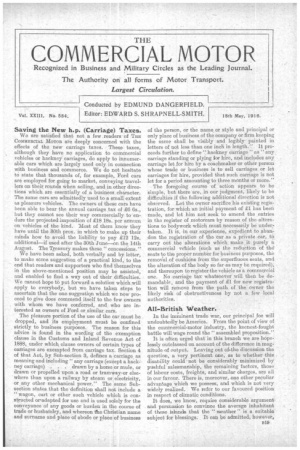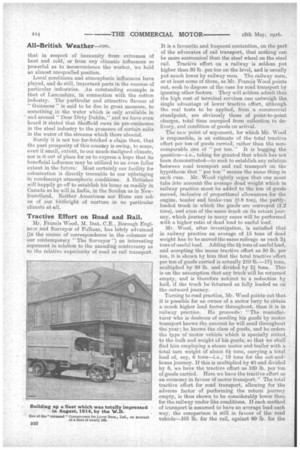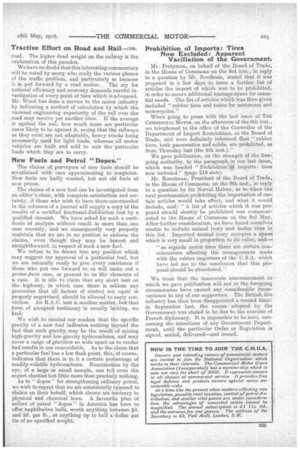Saving the New h.p. (Carriage) Taxes.
Page 1

Page 2

Page 3

If you've noticed an error in this article please click here to report it so we can fix it.
We are satisfied that not a few readers of THE _CommsaciaL MoTon are deeply concerned with the effects of the new carriage taxes. These taxes, although they have no application to commercial vehicles or hackney carriages, do apply to innumerable cars which are largely used only in connection with business and commerce. We do not hesitate to state that thousands of, for example, Ford cars are employed for going to market, conveying travellers on their rounds when selling, and in other directions which are essentially of a business character. The same cars are admittedly used to a small extent as pleasure vehicles. The owners of these ears have been able to bear the annual carriage tax of Os., but they cannot see their way commercially to endure the projected imposition of £18 18s. per annum on vehicles of the kind. Most of them know they haVe until the 30th prox. in which to make up their minds how to avoid the liability to pay £12 12s. additional—if used after the 30th June—on the 14th August. The Treasury makes these " concessions."
We have been asked, both verbally and by letter, to make some suggestion of a practical kind, to the end that readers and supporters who find themselves in the above-mentioned position may be assisted, and. enabled to find a way out of their difficulties. We cannot hope to put forward a solution which will apply to everybody, but we have taken steps to ascertain that the one suggestiqn which we now pro-. ceed to give does commend itself to the few owners with whom we have conferred, and, who are interested as owners of Ford or similar cars.
The pleasure portion of the use of the car must be dropped,. and its employment must be confined strictly to business purposes. The reason for this advice is found in the wording of the exemption clause in the Customs and Inland Revenue Act of 1889, under which clause owners of certain types of carriages are exempted from carriage tax. Section 4 of that Act, by Sub-section 3, defines a carriage as meaning and including " any carriage (except a hack ney carriage). . drawn by a horse or mule, or drawn or propelled upon 'a road. or tramwapor elsewhere than upon a railway by steam or electricity, or any other mechanical power." The same Subsection states that the definition shall hot include a wagon, cart or other such vehicle which is constructed oradapted for use and is used solely for the conveyance of any goods or burden in the course of trade or husbandry, and whereon the Christian name and surname and place of abode or place of' business of the person, or the name or style and principal or only place of business of the company or firm keeping the same shall be visibly and legibly painted in letters of not less than one inch in length." It proceeds further to define "hackney carriage" as "any carriage standing or plying for hire, and includes any carriage let for hire by a coachraaker or other person whose trade or business is to sell carriages or let carriages for hire, provided that such carriage is not let for a period amounting to three months or more." The foregoing course of action appears to be simple, but there are, in our judgment, likely to be .difficulties if the following additional direction is not observed: Let the owner sacrifice.his existing registration, for whichan initial payment of £1 has been made, and let him not seek to amend the entries in the register of motorcars by reason of the alterations to bodywork whieh must necessarily be under." taken. It is, in our iexp.erience, expedient to abandon the registration of the car as a private car, tO carry out the alterations which make, it purely a commercial vehicle (such as the rednetion of the' seats to the proper number for business purposes, the removal of cushions from the superfluous seats, and the alteration of the body so far as may be required); and thereupon to register the vehicle as a commercial one.. No carriage tax whatsoever will then be demandable, and the payment of for new registration will rat/Love from the path of the owner the likely risk of obstructiveness by not a few local authorities.
All-British Weather.
In the imminent trade war, our principal foe will undoubtedly be America. From the point of view of the cominercial-motor industry, the keenest-fought. battle will wage round the "assembled proposition." It is often urged that-in this branch we are hopelessly outclassed on account of the difference in magnitude of output. Leaa'ing out of.the discussion the question, a very pertinent one, as to whether this disability could not be considerably minimized by pOshful salesmanship, the remaining factors, those.. of labour costs, freights, and similar charges, are all in our favour. There is, moreover, one other peculiar advantage which we possess, and which is not very widely realized. We refer to our favoured position in respect of climatic conditions. It does, we know, require considerable argument and persuasion to convince the average inhabitant of these iskt.nclts that the " weather " is a suitable subject for blessings. It can be admitted, h6W-ever, that in respect of immunity from extremes of heat and cold, or from any climatic influences so powerful as to inconvenience the worker, We hold an almost unequalled position.
Local conditions and atmospheric influences have played, and do still, important parts in the success of particular industries. An outstanding example is that of Lancashire; in connection with the cotton industry. The particular and attractive flavour of " Guinness " is said to be due in great measure, to something in the water which is only available in and around "Dear Dirty Dublin," and we have even heard it stated that Sheffield owes its pre-eminence in the steel industry to the presence of certain salts in the water of the streams which there abound.
Surely it is not too far-fetched a cl4m then, that the past prosperity of this country iS owing, to some; even if small, extent, to our much-maligned climate, nor is it out of place for us to express a hope that its beneficial influence may be utilized to an even fuller extent in the future: Most certainly our facility for colonization is directly traceable to our upbringing in nondescript atmospheric conditions. A Britisher will happily go off to establish his home as readily in Canada as he will in India, in the Soudan as in Newfoundland. Neither Americans nor Huns can rob Its of our birthright of nurture in no particular climate .at Tractive EH. ort on Road and Rail.
Mr. Francis Wood, M. Inst. CE., Borough Engine2r and Surveyor of Fulham, has lately advanced _(in the course of correspondence in the columns of our contemporary "The Surveyer ") WI interesting argument in relation to the unending controversy as to the relative supei iority' of road or rail transport. It is a favourite and frequent contention, on the part of the advocates of rail transport, that nothing can be more economical than the steel wheel on the steel rail. Tractive effort on a railway ' is seldom put higher than 30 lb. per ton on the level, and is usually put much lower by railway men. The railway men, or at least some of them, as Mr. Francis Wood points out, seek to dispose of the case for road transport by ignoring other factors. They will seldom admit that the high cost of terminal services can outweigh the. 'Single advantage of lower tractive effort, although the real tests to be applied, from a commercial standpoint, are obviously those of point-to-point charges, total time occupied from collection to delivery, and condition of goods on arrival.
The new Point of argument, for which Mr. Wood is responsible, is an estimate of the total tractive effort per ton of goods carried, rather than the noncomparable one of "per ton." It is begging the question—i.e., taking for granted that which has not been demonstrated—to seek to establish any relation between road transport and rail transport on the hypothesis that " per ton" means the same thing in each 'ease. Mr. Wood rightly urges that one must take into account the average dead weight which in railway practice must be added to the ton of goods moved, inclusive of proportional allowances for the engine, tender and brake-van (0.8 ton), the partly. loaded truck in which the goods are conveyed (2.2 tons), and even of the same truck on its return journey, which journey in many cases will be performed with a higher ratio of dead load to useful load.
Mr. Wood, after investigation, is satisfied that in railway practice an average of 15. tons of dead weight has to be moved the same mileage as each 21 tons of useful load. Adding the 21tons of useful load, and accepting the mean tractive effort as 30 lb. per ton, it is shown by him that the total tractive effort per ton of goods carried is actually 210 lb.-171 tons, multiplied by 30 lb. and divided by 21 tons. This is on the assumption that any truck will be returned empty, and is therefore subject to a reduction by half, if the truck be returned as fully loaded as on the outward journey.
Turning to road practice, Mr. Wood points out that it is possible for an owner of a motor lorry to obtain a much higher load factor throughout, than it is in railway practice. He proceeds : "The manufaeturer who is desirous of sending his goods by motor transport knows the amount he will send throughout the year; he knows the class of goods, and he orders the type of motor vehicle which is specially suited, to the bulk and weight of his goods, so that we shall find him employing a steam motor and trailer with a total tare weight of about 6 tons, carrying a total load of, say, 6 tons—Le., 19 tons for the out-andhome journey. If this is multiplied by 40 and divided by 6, we have the tractive effort as 160 lb. per ton of goods carried. Here we have the tractive effort as an economy in favour of motor transport." The total tractive effort for road transport, allowing for the adverse factor of performing the return journey empty, is thus shown to be considerably lower than for the railway under like conditions. If each method of transport is assumed to have an average load each way, the comparison is still in favour of the road vehicle-105 lb. for the rail, against 80 lb. for the road. The higher dead weight on the railway is tho explanation of this paradox.
We have no doubt that this interesting commentary will be noted by many who study the various phases of the traffic problem, and particularly so_ because it is put forward by a road maker. The cry for national efficiency and economy demands careful investigation of every point of view which is advanced. Mr. Wood has done a service to the motor industry by indicating a method of calculation by which the vaunted engineering superiority 9f the rail over the road may receive yet another blow: If the average is against the rail, how much more are particular cases likely to be against it, seeing that the railways as they exist are not adaptable, heavy trucks being necessarily used for light loads, whereas all motor vehicles are built and sold to suit the particular loads which they are to carry.
New Fuels and Petrol "Dopes."
The claims of purveyors of new fuels should be scrutinized with care approximating to suspicion. New fuels are badly wanted, but not old fuels at new prices.
The claims of a new fuel can be investigated from an editor's chair, with complete satisfaction and certainty, if those who wish to have them-'commended • in the columns of a journal will supply a copy of the . results of a certified fractional-distillation test by a qualified chemist. We have asked for such a certificate of analysis without result in more than one case recently, and we consequently very properly maintain that we are in no position to endorse the claims, even though they may be honest and straightforward, in respect of such a new fuel.
We refuse to be drawn into any position which may suggest our approval of a particular fuel, but we are naturally ready to give every assistance if those who put one forward to us will make out a prima-facie case, or present to ns the elements of a case. It is idle to claim that any short test on the highway, in which case there is seldom any guarantee that all factors of control are equal or properly supervised, should be allowed to carry conviction. An R.A.C. test is another matter, but that form of accepted testimony is usually lacking, we find; We wish to remind our readers that the specifie gravity of a new fuel indicates nothing beyond the fact that such gravity may be the result of mixing high-gravity and low-gravity hydrocarbons, and may cover a range of gravities so wide apart as to render bad results in use unavoidable. As to the claim that a particular fuel has a low flash point, this, ,of course, indicates that there is in it a certain percentage of readily-volatile hydrocarbons. Examination by the eye, of a large or small sample, can tell even the expert cherhist but little more than precisely nothing.
As to " dopes " for strengthening ordinary petrol, we wish to repeat that we are consistently opposed to claims on their behalf, which claims are contrary to physical and chemical laws. A favourite plan of sellers of petrol "dopes " in America has been to offer naphthaline balls, worth anything between id. and 2d. per lb., at anything up to half a dollar per tin of no specified weight..
Prohibition of Imports: 'Tires Now Excluded: Apparent Vacillation of the Government.
Mr: Pretyrnan, on behalf of the Board of Trade, in the House of Commons on the 3rd inst.., in reply to a question by M. Needham, stated that it was proposed in a few days to issue a further list of articles the import of which was to be prohibited, in order to secioe additional tonnage-space for essential needs. The list of articles which was then given included "rubber tires and tubes for motorcars and motorcycles." When going to press with the last issue of THE COMMEPOTAL Moron, on the afternoon of the 8th inst., we telephoned to the office of the Controller of the Department of Import RestrietiOns, at the Board of Trade, and were definitely informed that rubber tires, both pneumatics and solids, are prohibited, as from Thursday last (the 4th inst.)." We gave publication, on the strength of the fore-: going authority, to the paragraph in our last issue, which was headed "Prohibition of imports: tires how included" (page 213 ante). • • Mr. Runciman, President of the Board of Trade,. in the House of Commons, on the 9th inst., in reply to a question by Sir Norval Helme, as to when the: next proclamation prohibiting the importation of cer-; tain articles would take effect, and what it would.. include, said: "A list of articles which it was proposed should shortly be prohibited was communi-: eated to the House of Commons on the 3rd May. 'After-further consideration, we have found ourseivee unable to include animal ivory and motor tires in this list. Imported animal ivory occupies a spec,* which is very sinall in proportion to its value, and " as regards motor, tires there are certain con siderations affecting the arrangements made with the rubber importers of the U.S.A. which have led me to the conclusion that this pro posal.should be abandoned."
We trust that the inaccurate announcement to which we ga-ce publication will not in the foregoing circumstance have caused any considerable inconvenience to any of our supporters. The British tire industry has thus been disappointed a second time : in September last, the course adopted by the Government was stated to be due to the exercise of French diplomacy. It is impossible to be sure, concerning the intentions of any Government Department, until the particular Order or Regulation is signed, sealed, delivered—and issued.




















